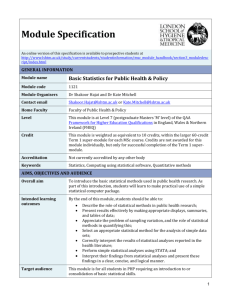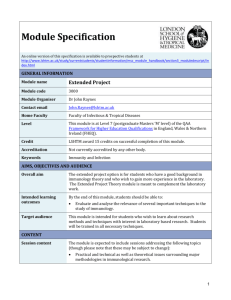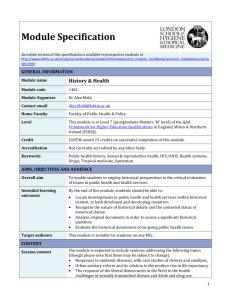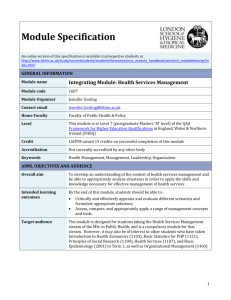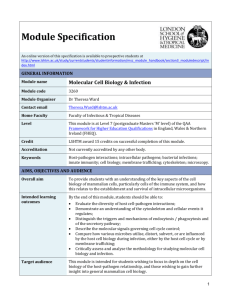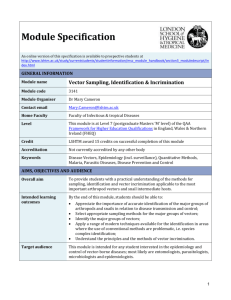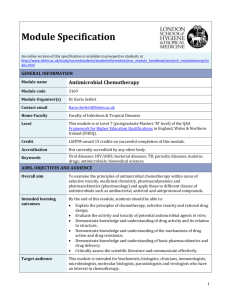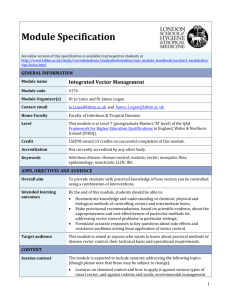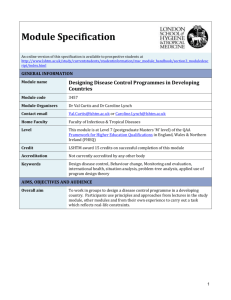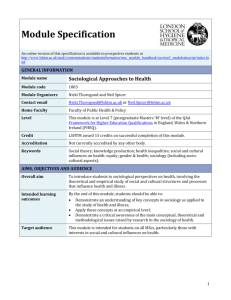Programme Specification * MSc Epidemiology
advertisement
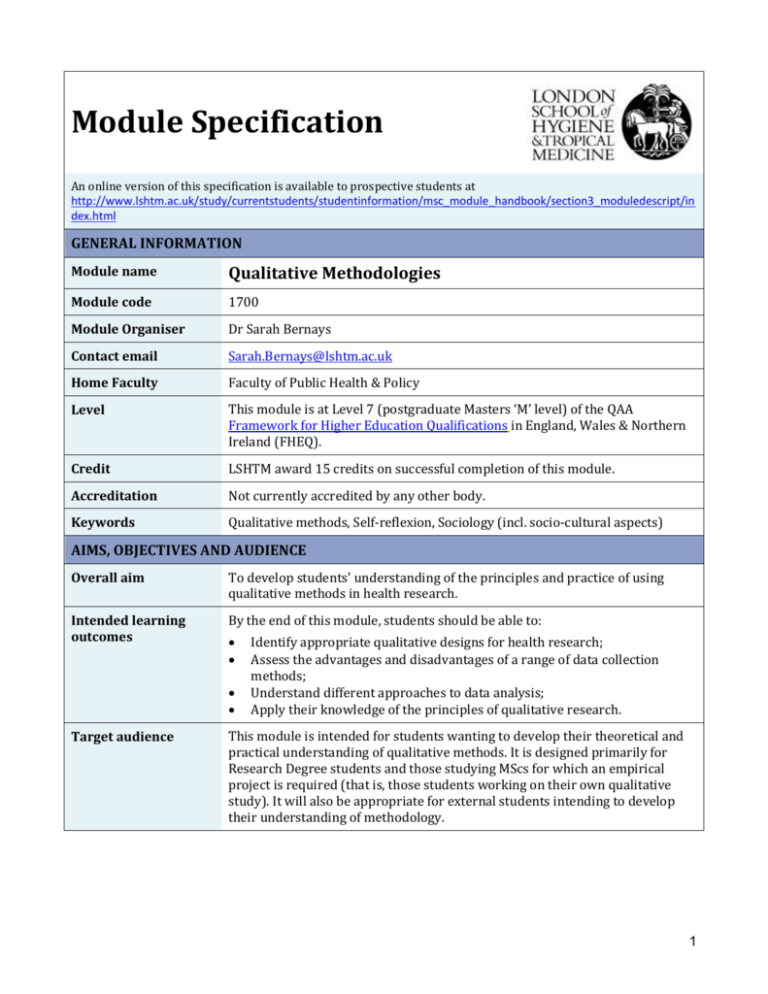
Module Specification An online version of this specification is available to prospective students at http://www.lshtm.ac.uk/study/currentstudents/studentinformation/msc_module_handbook/section3_moduledescript/in dex.html GENERAL INFORMATION Module name Qualitative Methodologies Module code 1700 Module Organiser Dr Sarah Bernays Contact email Sarah.Bernays@lshtm.ac.uk Home Faculty Faculty of Public Health & Policy Level This module is at Level 7 (postgraduate Masters ‘M’ level) of the QAA Framework for Higher Education Qualifications in England, Wales & Northern Ireland (FHEQ). Credit LSHTM award 15 credits on successful completion of this module. Accreditation Not currently accredited by any other body. Keywords Qualitative methods, Self-reflexion, Sociology (incl. socio-cultural aspects) AIMS, OBJECTIVES AND AUDIENCE Overall aim To develop students' understanding of the principles and practice of using qualitative methods in health research. Intended learning outcomes By the end of this module, students should be able to: Target audience Identify appropriate qualitative designs for health research; Assess the advantages and disadvantages of a range of data collection methods; Understand different approaches to data analysis; Apply their knowledge of the principles of qualitative research. This module is intended for students wanting to develop their theoretical and practical understanding of qualitative methods. It is designed primarily for Research Degree students and those studying MScs for which an empirical project is required (that is, those students working on their own qualitative study). It will also be appropriate for external students intending to develop their understanding of methodology. 1 CONTENT Session content The module is expected to include sessions addressing the following topics (though please note that these may be subject to change): Principles of qualitative study: Assumptions about the social world and how to research it; debates in the use of qualitative research in policy orientated qualitative work. Data collection methods: Producing data using in-depth one to one and group interviews; ethnographic approaches; developing interview skills; practical issues in participant observation fieldwork. Analysing data: Approaches to data analysis (thematic analysis, grounded theory); using manual and computer assisted aids to data management and analysis (Note: there are no practical sessions on computer aided analysis). TEACHING, LEARNING AND ASSESSMENT Study resources provided or required A course reader is provided which outlines the course, including details of each session and many of the key readings. Reading lists for additional background literature are also provided in the reader. Teaching and learning methods The module comprises short presentations from lecturers on key topics, followed by student led seminar work. Students are expected to participate in all activities. Assessment details This module is assessed by a 1720 – 2000 word essay answering one of four set questions. For students who are required to re-sit, or granted a deferral or new attempt, the tasks will be to write a 1750-2000 word essay answering one of two set questions, which would be based on the principles covered in the module and different to those used in the original assessment task. Assessment dates Assessments will be due on Friday 12 February 2016. For students who are required to re-sit, or granted a deferral or new attempt, the next assessment deadline will be the standard School-recommended date in mid/late September 2016. Re-sit essay titles will be released in advance to allow for the same amount of time to be spent on the coursework as in the original assignment. Language of study and assessment English (please see ‘English language requirements’ below regarding the standard required for entry). TIMING AND MODE OF STUDY Duration The module runs for 5 weeks at 2.5 days per week; this module runs between Wednesday lunchtime and Friday afternoon. Dates For 2015-16, the module will start on Wednesday 13 January 2016 and finish on Friday 12 February 2016. Timetable slot The module runs in LSHTM timetable slot C2. 2 Mode of Study The module is taught face-to-face in London. Both full-time and part-time students follow the same schedule. For full-time students, other LSHTM modules are available in the other half of the week for the C and D slots. Learning time The notional learning time for the module totals 150 hours, consisting of: Contact time ≈ 30 hours Directed self-study ≈ 20 hours Self-directed learning ≈ 50 hours Assessment, review and revision ≈ 50 hours. APPLICATION, ADMISSION AND FEES Pre-requisites The linear module Principles of Social Research [1104] (or equivalent) is a prerequisite for this module. English language requirements A strong command of the English language is necessary to benefit from studying the module. Applicants whose first language is not English or whose prior university studies have not been conducted wholly in English must fulfil LSHTM’s English language requirements, with an acceptable score in an approved test taken in the two years prior to entry. Applicants may be asked to take a test even if the standard conditions have been met. Student numbers Student numbers are typically 25-30 per year; numbers may be capped due to limitations in facilities or staffing. Student selection Preference will be given to LSHTM MSc students, particularly those are registered for Public Health or Public Health in Developing Countries and who have undertaken the Principles of Social Research module, and LSHTM research degree students. Other applicants meeting the entry criteria will usually be offered a place in the order applications are received, until any cap on numbers is reached. Applicants may be placed on a waiting list and given priority the next time the module is run. Partial Registration (partial participation) by LSHTM research degree students is allowed for this module. Fees For registered LSHTM MSc students, fees for the module are included within MSc fees (given on individual course prospectus pages). If registering specifically for this module, as a stand-alone short course, individual module fees will apply. Tuition fees must be paid in full before commencing the module, or by any fee deadline set by the Registry. Scholarships Scholarships are not available for individual modules. Some potential sources of funding are detailed on the LSHTM website. 3 Admission deadlines For 2015-16: For registered LSHTM MSc students, the module choice deadline (for Term 2 and 3 modules) is Friday 20 November 2015. If registering specifically for this module, applications may be made at any time but, as places are limited, early application is recommended. All applications should be submitted by, at the latest, 8 weeks prior to the start of the module. Formal registration will take place on the morning of the first day of the module. ABOUT THIS DOCUMENT This module specification applies for the academic year 2015-16 Last revised 4 August 2014 by Sarah Bernays Minor amendments SDB 20th July 15 London School of Hygiene & Tropical Medicine, Keppel St., London WC1E 7HT. www.lshtm.ac.uk 4

